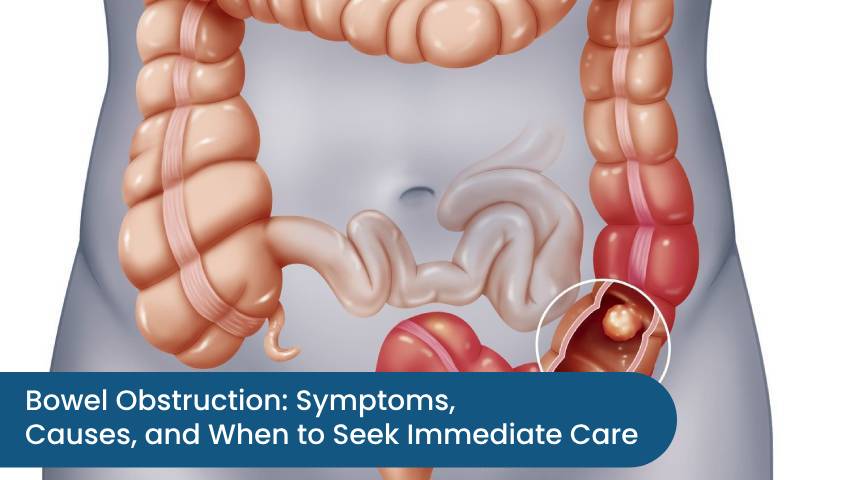
- 09/10/2024
- Kaizen Gastro Care
- 0 Comments
- Gut Health
Bowel Obstruction: Symptoms, Causes, and When to Seek Immediate Care
Bowel obstruction is a severe condition that happens when the normal movement of food and fluids through the intestines is blocked. It can affect both the small and large intestines and needs prompt medical attention to avoid severe complications. Understanding the symptoms, causes, and when to seek immediate care can be life-saving.
Dr. Samrat Jankar is a leading Gastrointestinal Surgeon in Pune at Kaizen Gastro Care with expertise in treating a wide range of digestive problems, including bowel obstructions. His patient-centric approach ensures the best care and treatment outcomes.
Here’s what you need to know about bowel obstruction.
What is Bowel Obstruction?
Bowel obstruction refers to the blockage that stops the passage of food, gas, and waste through the digestive system. This blockage can occur for various causes, including physical obstructions or functional problems that disrupt the natural movement of the intestines.
Common Symptoms of Bowel Obstruction:
The signs of bowel obstruction can change depending on the location and severity of the blockage. However, the most common symptoms to watch for include:
- Abdominal Pain: Severe cramping or abdominal discomfort, usually happening in waves.
- Nausea and Vomiting: Regular vomiting, especially after eating, can indicate an obstruction.
- Swollen Abdomen: Bloating and swelling in the abdominal area may happen due to trapped gas and fluids.
- Constipation: Difficulty passing stool or gas, sometimes alternating with diarrhea.
- Loss of Appetite: A feeling of fullness or a complete lack of appetite.
- Inability to Pass Gas: This is an indicative signal that something is preventing the normal movement of bowel contents.
- Diarrhea: In some cases, liquid stool may pass around the obstruction, resulting in paradoxical diarrhea.
Causes of Bowel Obstruction:
Several aspects can contribute to bowel obstruction, including:
Mechanical Obstructions:
- Adhesions: Scar tissue from prior surgeries can form and cause blockages in the intestines.
- Hernias: Portions of the intestine can become trapped in weakened areas of the abdominal wall.
- Tumors: Cancerous growths within the intestines can obstruct the normal passage of food and fluids.
- Diverticulitis: Inflammation or infection in small pouches within the colon can lead to blockages.
- Volvulus: The intestine twists around itself, leading to a sudden and dangerous obstruction.
- Intussusception: This happens when a part of the intestine slides into an adjacent section, often seen in children but can happen in adults as well.
Non-Mechanical Obstructions:
- Paralytic Ileus: This functional obstruction happens when the muscles of the intestine fail to work properly, often due to infection, surgery, or certain medications.
- Inflammatory Conditions: Diseases such as Crohn’s disease or severe infections can cause bowel obstruction without a physical blockage.
When to Seek Immediate Care?
Bowel obstruction is a medical emergency, specifically if you experience any of the following signs:
- Severe, constant abdominal pain that doesn’t go away.
- Frequent vomiting, especially if it includes bile or fecal material.
- High fever along with abdominal pain.
- Signs of dehydration: Dry mouth, dark urine, or dizziness.
- Inability to pass stool or gas for several hours accompanied by bloating and discomfort.
If you experience any of these signs, it is crucial to seek immediate medical care. Delaying treatment could lead to complications such as:
- Perforation: The blockage can cause the intestinal walls to rupture, leading to life-threatening infections.
- Tissue Death: A prolonged obstruction can cut off blood flow to part of the intestines, causing tissue death and infection (gangrene).
- Sepsis: If bacteria from the intestines enter the bloodstream due to perforation or infection, it can result in a dangerous condition called sepsis.
Diagnosis and Treatment:
At Kaizen Gastro Care, Dr. Samrat Jankar and his team use advanced diagnostic tools such as X-rays, CT scans, and ultrasounds to accurately diagnose bowel obstructions. Once determined, treatment varies depending on the severity and cause of the obstruction.
- Non-Surgical Treatments: Some mild cases of bowel obstruction can be treated with bowel rest, IV fluids, and medications to ease pain or nausea.
- Surgical Intervention: In extreme cases or when non-surgical methods fail, surgery must remove the blockage or repair the intestines.
Conclusion:
Bowel obstruction is a serious condition that should never be ignored. If you or a loved one experiences any of the symptoms noted above, especially if they worsen over time, seek immediate care. The best bowel obstruction specialist in Pune, Dr. Samrat Jankar, and the dedicated team at Kaizen Gastro Care specialize in diagnosing and treating gastrointestinal issues, ensuring prompt and effective treatment for bowel obstructions.
For more information or to book an appointment, visit Kaizen Gastro Care in Pune for professional consultation and care.
